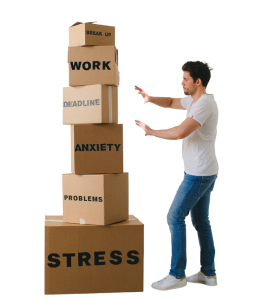Knowing how to relieve stress is a skill that many of us strive to understand. We have busy lives, stressful jobs and the 24/7 news cycle and availability of entertainment means that we live in a world that never sleeps.
Add to that the constant merry-go-round of getting the kids to school, clubs, and so on and household logistics, and the constant pull of devices with screens. So is it any wonder that we sometimes feel overwhelmed and feel the effects of stress?
Table of Contents
What is stress and how do we feel stress?
First of all, the human body requires an amount of stress to function properly. The body releases stress hormones like cortisol, adrenaline, and norepinephrine that help to manage blood sugar, the fight or flight response, and a number of other critical functions. Released correctly, they benefit the body.
Problems occur when stress becomes toxic and the body tries to compensate. That’s when physical effects and health problems can occur, especially if exposure to stress is something that happens over the long term.
The stress response can leave you feeling tired, suffering muscle tension and fatigue, and in serious cases of chronic stress can have a deleterious effect on mental health. People feel stress in different ways, but there is a baseline to consider.
Among the more common symptoms are:
- Short-tempered, irritable, or angry
- Depressed
- Loss of sense of humour
- Nervous or feelings of fear
- Anxiety
- Disinterested in everyday life
What are the Stress Relief Strategies that will help you to Thrive?
For most of us, we deal with stress every day and have learned how to relieve stress ourselves. It may not even occur to us that the relaxation techniques that we use to unwind are actually our stress relief tools. Deep breathing, physical activity, and a healthy diet can all contribute to maintaining a healthy balance in our lives.
But when stress begins to overwhelm us we may need to employ other techniques. That notwithstanding, what we’re about to discuss will help maintain a healthy, happy lifestyle irrespective of whether we are deploying them to manage our stress levels. Understanding the signs is important, and learning how to relieve stress is a critical skill.
 How to Relieve Stress: #10 ways to hit the off switch
How to Relieve Stress: #10 ways to hit the off switch
Everyone has different ways of coping with stress. And most people have learned how to relieve stress. Why not post some of your thoughts and ideas on our social channels? Learning how to relieve stress is a unique experience for everyone.
Ditch the Screen
It’s a well known fact that the blue light in mobile phones and tablets can trick the brain into thinking that it’s daylight and can affect the sleep/wake cycle.
This in itself can upset sleep patterns. So ditch the phone at bedtime. If you need to unwind, why not read instead? But it’s not only the sleep/wake cycle that can be affected.
Having access to a phone means being connected to everything all the time. IT can put pressure on people to be available all the time, and put pressure on someone who may feel that theta re missing out. This is called FOMO, or the fear of missing out, and can be a cause of stress.
It’s great to be able to stay in touch and mobile phones and other technology have enabled that, even across the globe. But do you really need to have your phone next to you all the time?
Go Green
It is very well documented that the outdoors and exercise have a positive impact on mental health. And being outdoors doesn’t mean climbing mountains or water skiing, but taking a walk in the park, a run or walking the dog in the countryside will all allow you to unwind, relax and clear your mind. Oh and leave your phone at home. For that half hour will you really miss anything critical?
Work/life Balance
A good work/life balance means that you can enjoy the results of your work, whether that’s being able to take holidays, live in a nice house, or whatever is important. But the point is that work shouldn’t govern your life. This has become more difficult in the post-Covid era, as more and more people are now working from home.
If you are a home worker, consider where in your home you work, how you’re going to put your work away at the end of the day, and the boundaries that you’re going to set. No employer has a right to your time 24/7, but if you make yourself available you could lead yourself into that position. Does that email at 8 pm really need answering now?
Probably not, it can wait for the next working day. Oh and if you have a work mobile phone and you’re not on call, why not put it away?
The same rules apply to self-employed people. Probably more so because if things go wrong it’s far more serious. But again, unless you’re on call, can that 8 pm email wait until morning?
No, No, No
Our 4th point isn’t about being difficult. It’s about setting boundaries. These could be at work- you don’t answer the phone or email outside office hours– with your children, partner, or family. You aren’t a taxi, family therapist, counsellor, fixer, or anything else 24/7.
Sometimes its ok to say no. You’re only human right? If you become caught up in everything and never say no, you’re likely, at some point, to be overcome with the stress of everything.
So set yourself some boundaries, and be clear with people if the answer is no. That could also include social activities. Sometimes you might just want to sit in front of the TV on a Saturday night and relax. That’s ok too.
The point is that the boundaries you set are there for you to be able to look after yourself, but also so that the people around you get the best of you.
You’re not a sponge
There are two parts to this point. Firstly, if you find yourself in the position, or you put yourself there, of being the ‘go-to’ person for everyone’s problems. It can be very rewarding to be able to help someone through a difficult time and flattering to be asked for advice.
And we’re not suggesting for a moment that you should stop being that person. But it’s all too easy to become the sounding board, organiser, advisor, or therapist for people. And that position can become stressful.
Secondly, that stress could become toxic if you take on those issues or challenges that people want to talk to you about. It’s important not to absorb those problems. It can be all too easy for people to offload- without even realising it- their own problems and feel better. So be mindful that whilst you could be a sounding board, the problems aren’t yours to take ownership of or responsibility for.
And relax…
One of the more straightforward ways of learning how to relieve stress. Allow yourself time to stop and relax. What is it that you enjoy and that relaxes you? Perhaps you enjoy reading, writing, playing an instrument, or something else. Give yourself ‘me time’. Remember the boundaries that we looked at in point 4?
Set boundaries for the people around you. If reading is your go-to relaxation and you’re reading, make it clear that you don’t want to be disturbed for that half hour. That’s ok. And don’t be tempted to just sort ‘the thing’ out. All you’ll do is step over your own boundary which gives license to other people to step over it. And you can say goodbye to your relaxation time.
Procrastination isn’t your friend
Have you had that feeling when you just can’t be bothered, better to sort something out tomorrow. That’s procrastination. It means you set yourself up to create a stressful situation for yourself later on. ‘The thing’ might not be a stressful situation itself, but leaving things to do later puts a marker in your mind that you’re overdue.
That will stay there until you deal with it. You might have left yourself a list of things to do that can add to your stress.
So take responsibility for the tasks that you have, plan when you’re going to do them, and deliver. It literally is a case of ‘job done, next!’
Friends and Family
Put simply, take time to spend time with your friends and family. It’s the opportunity to enjoy company, and share challenges, issues, and the things that bother you. After all, a problem shared….Of course, remember that taking responsibility for your own problems goes both ways, so don’t simply pass them on to someone else, in the same way as you don’t want to absorb a friend or relative’s problem.
Caffeine and Coffee
Too much caffeine can stimulate the release of cortisol, glucocorticoids, and catecholamines which can all contribute to stress if released in higher than normal volumes. The result can be high blood pressure and endocrine response, which can put the body on ‘high alert’. It can cause your mood to rise and dip, leaving a craving for caffeine as your mood dips. How much caffeine is too much depends very much on the individual? So in this instance learning how to relieve stress means implementing good habits into your routine.
Mindfulness and Meditation
These are two very different disciplines. Mindfulness allows your mind to relax and look outward, becoming aware of the things around you, while meditation is a technique that allows a more inward, focussed technique of relaxation. Both can be highly effective in managing stress, and both can be a valuable addition to the tools that you employ in learning how to relieve stress.
Learn how to relieve stress and put your coping mechanisms in place here
For more resources visit the MIND website

Recent Comments